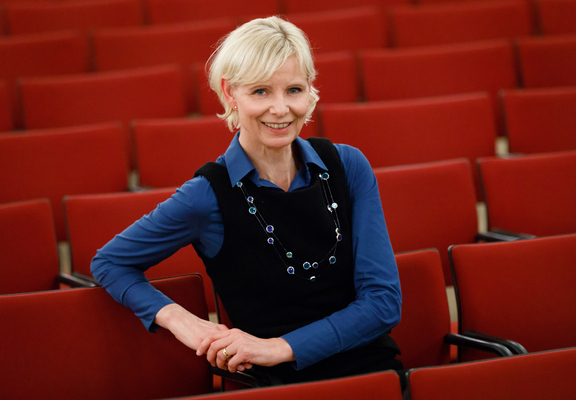Prof. Veronika Somoza Elected Deputy Section Spokesperson of the Leibniz Association

Freising, March 29, 2023
On March 16, 2023, the directors of Section C Life Sciences with a focus on biodiversity and health of the Leibniz Association elected Prof. Veronika Somoza as their deputy spokesperson for two years. The distinguished scientist is thus also a deputy member of the Leibniz Association's Presidential Board.
Veronika Somoza has been director of the Leibniz Institute for Food Systems Biology at the Technical University of Munich since November 2019 and is the first woman to hold the office of deputy spokesperson for Section C. With 24 institutes, the latter is one of the largest of the five Leibniz Sections.
In the future, Veronika Somoza will assist the also newly elected spokesperson of Section C, Prof. Jörg Overmann, who heads the Leibniz Institute DSMZ-German Collection of Microorganisms and Cell Cultures. The tasks of the section spokespersons include representing the respective section in various Leibniz bodies such as the Presidium, the Senate Committee on Competition, and the Group of “Forschungsfeldbetrachtungen.” Likewise, the spokespersons participate as guests in evaluation visits and are entrusted with the organization of the section's work.
Personal details:
Prof. Somoza is involved in the isolation and characterization as well as bioactivity and bioavailability of food constituents. She investigates how their complex networks determine the sensory quality of food and influence our bodily functions. To this end, she and her scientists are pursuing the still young interdisciplinary research approach of food systems biology.
After studying ecotrophology at the Justus Liebig University in Giessen, Prof. Somoza obtained her doctorate at the University of Vienna. In 1996, she accepted an assistant professorship at the Institute of Nutritional and Food Sciences at the Christian-Albrechts-University in Kiel. After a research stay in 2001 at the University of South Carolina, Columbia, USA, Prof. Somoza habilitated in 2002 and received the venia legendi for the field of "Human Nutrition and Food Science" in Kiel. In 2003, she moved to the German Research Center for Food Chemistry, where she served as Vice Director until 2007, and received the venia docendi for "Food Science" from the Technical University of Munich, Faculty of Chemistry. From 2007 to 2009, she continued her research as Associate Professor at the Department of Food Science, University of Wisconsin/Madison, USA. In 2009, she accepted an appointment at the University of Vienna, where she headed the research platform "Molecular Food Sciences" as Professor and Chair from 2009 to 2011. From 2011 to 2019, she was Chair of the Department of Physiological Chemistry, where she also directed the "Christian Doppler Laboratory of Bioactive Aroma Compounds." Likewise, she officiated at the University of Vienna as Vice Dean of the Faculty of Chemistry from 2014 to 2019.
In November 2019, Prof. Somoza was appointed to the Technical University of Munich, where she holds a professorship and the chair of Nutritional Systems Biology and is a member of ZIEL - Institute for Food & Health. Likewise, since then she has been the director of the Freising Leibniz Institute for Food Systems Biology at the Technical University of Munich and also serves as Co-Chair of the Department of Physiological Chemistry at the University of Vienna.
Press Contact:
Dr. Gisela Olias
Leibniz Institute for Food Systems Biology at the Technical University of Munich
Knowledge Transfer, Press and Public Relations
Phone: +49 8161 71-2980
E-mail: g.olias.leibniz-lsb(at)tum.de
Information about the Institute:
The Leibniz Institute for Food Systems Biology at the Technical University of Munich comprises a new, unique research profile at the interface of Food Chemistry & Biology, Chemosensors & Technology, and Bioinformatics & Machine Learning. As this profile has grown far beyond the previous core discipline of classical food chemistry, the institute spearheads the development of a food systems biology. Its aim is to develop new approaches for the sustainable production of sufficient quantities of food whose biologically active effector molecule profiles are geared to health and nutritional needs, but also to the sensory preferences of consumers. To do so, the institute explores the complex networks of sensorically relevant effector molecules along the entire food production chain with a focus on making their effects systemically understandable and predictable in the long term.
The Leibniz Institute for Food Systems Biology at the Technical University of Munich is a member of the Leibniz Association, which connects 97 independent research institutions. Their orientation ranges from the natural sciences, engineering and environmental sciences through economics, spatial and social sciences to the humanities. Leibniz Institutes devote themselves to social, economic and ecological issues. They conduct knowledge-oriented and application-oriented research, also in the overlapping Leibniz research networks, are or maintain scientific infrastructures and offer research-based services. The Leibniz Association focuses on knowledge transfer, especially with the Leibniz Research Museums. It advises and informs politics, science, business and the public. Leibniz institutions maintain close cooperation with universities - among others, in the form of the Leibniz Science Campuses, industry and other partners in Germany and abroad. They are subject to a transparent and independent review process. Due to their national significance, the federal government and the federal states jointly fund the institutes of the Leibniz Association. The Leibniz Institutes employ around 21,000 people, including almost 12,000 scientists. The entire budget of all the institutes is more than two billion euros.
+++ Stay up to date via our Twitter channel twitter.com/LeibnizLSB +++
